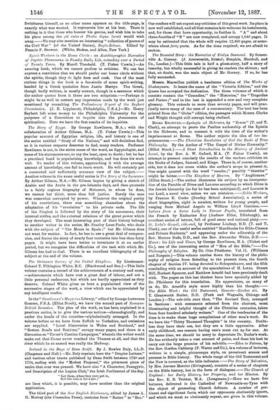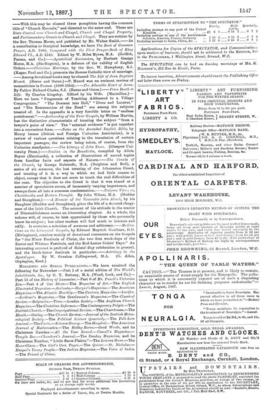Bowes RECEIVED.—Apoiogia ad Hebraeoa, by " Zemin" (T. and T.
Clark), an attempt to prove the Panties authorship of the Epistle to the Hebrews, and to connect it with the time of the writer's imprisonment at Rome. The author rejects the idea of two im- prisonmente.—The Christian Revelation of God the Basis of True Philosophy. By the Author of "The Gospel of Divine Humanity." (Elliot Stock.)—A Short Introduction to the History of Ancient Israel, by the Rev. A. W. Oxford, MA. (T. Fisher Unwin), an attempt to present concisely the results of the modern criticism on the Books of Judges, Samuel, and Kings. There is, of course, another side, but it does not come within the author's scope to present it. One might quarrel with the word " results ;" possibly " theories " might be better.—The Kingdom of Heaven. By " Anglioanae.' (Elliot Stook.)—The author illustrates his subject by an interpreta- tion of the Parable of Dives and Lazarus according to which Dives is the Jewish hierarchy (so far he has been anticipated), and Lazarus' is our Lord, a novel view, slakes we are mistaken.—Noble Workers, by Frances E. Cooke (Sunday School Association), a series of short biographies, eight in number, written for young people, and ranging from Michael Angelo to William Lloyd Garrison.— Letters from a Swiss Lady to Former Pupils, translated from the French by Katharine Kay (Andrew Elliot, Edinburgh), an excellent series of letters, full of good sense and rational piety.— St. Luke's Gospel, xiii.-end, by Professor Lindsay, D.D. (T. and T. Clark), one of the useful series entitled "Handbooks for Bible-Classes, and Private Students'," and appearing under the editorship of the Rev. Marcus Dods, D.D., and the Rev. Alexander White, D.D.— Moses : his Life and Times, by George Rawlinson, M.A. (Nisbet and Co.), one of the interesting series of "Men of the Bible."—The Philosophy of Religion. By Dr. Otto Pfleiderer. Vol. IL (Williams and Norgate.)—This volume carries down the history of the philo- sophy of religion from. &belling to tho present time, the fourth chapter of Section IV. being devoted to Schopenhaner, and the fifth concluding with an account of the speculations of H. Lotus. Stuart Mill, Herbert Spencer, and Matthew Arnold had been previously dealt with. The pages on this last thinker have been specially added by Dr. Pfleiderer for this tranelation. He appreciates, as many of us do, Mr. Arnold's style more highly than his thought.— The Bible Work the Old Testament, Genesis--Exodus zii. By T. Glentworth Butler, D.D. (Funk and Wagnalla, Chicago and London.)—The enb.title runs thee, "The Revised Text, arranged in Sections with comments selected from the choicest, most illuminating and helpful thought of the Christian centuries, taken from four hundred scholarly writers." One of the tendencies of the time is to make these huge compilations of other men's work. So we have the "Thirty Thousand Thoughts" in this country. Doubt- less they have their use, but they are a little oppressive. After early childhood, one resents having one's meat cut up for one. At the same time, we should be sorry to depreciate Dr. Butler's work. He has evidently taken a vast amount of pains, and done his best to carry out the large promise of his sub-title.—Eden to Patmos, by the Rev. Gordon Calthrop (F. Warne and Co.), is a volume of lectures, written in a simple, picturesque style, on prominent scenes and persons in Bible history. The whole range of the Old Testament and the New is covered, as the title indicates.—The Story of Salvation, by Mrs. Jerome Mercier (Rivingtons), consists of a series of chapters on the Bible history, but in the form of dialogues.—The Church of England : her Early History, her Property, and her Mission. By the Rev. E. B. Trotter, M.A. (Longmans.)—Here we have five lectures, delivered in the Cathedral of Newcastle-on-Tyne with the object of promoting Church defence. A number of per- tinent and significant facts, which our opponents obstinately ignore, and which we must as obstinately repeat, are given in this volume. —With this may be classed three pamphlets having the common title of "Church Manuals," and directed to the same end. These are State Control over Church and Chapel, Church and Chapel Property, and Parliamentary Grants to Church and Chapel. They are written by the Rev. Thomas Moore, and published by Mr. Walter Bmith.—As a contribution to liturgical knowledge, we have The Book of Common Prayer, A.D. 1886, Compared with the First Prayer-Book of King Edward VI., A.D. 1549. Edited by W. Miles Myrea, MA. (Griffith, Ferran, and Co.)—Apostolical Succession, by Herbert George Morse, MA. (Skeffington), is a defence of the validity of English Orders.—Christian Marriage, by the Rev. W. Humphrey, 53. (Regal,. Paul and Co.), presents the Roman Catholic view of marriage. —Among devotional books may be classed The Life of Jean Baptiste dfuard. (Barns and Oates.)—P. Huard was an eminent reviver of monasticism in France (1809.1854).—The Adorable Heart of Jesus. By Father Richard Clarke, B.J. (Barns and Oates.) —From Death to Life. By Charles Kingsley. Edited by his Wife. (6faemillan.)— Here we have "Fragments of Teaching Addressed to a Village Congregation." " The Descent into Hell," "Dives and Lazarus," and 'The Resurrection of the Dead" are among the subjects treated of. In the appendix is a very forcible letter on "endless punishment."—Authorship of the Four Gospels, by William Marvin, has the distinctive chatheteriatio of treating the subject "from a lawyer's point of view." The "external evidence" is put together into a convenient form.—Notes on the Amended English Bible, by Henry tenon (British and Foreign Unitarian Association), is a review of various questions relating to the translation of certain important passages, the review being taken, of coarse, from the Unitarian standpoint.--The Liturgy of John Knox. (Glasgow Uni- versity Press.)—Studies in the Benedicite, compiled by Alicia Bayne (Hatehards), a collection of illustrations of sacred topics from familiar facts and aspects of Nature.—The Creeds of the Church, by George Balstrode, M.A. (Deighton and Bell), a aeries of six sermons, the last treating of the Atbanasian Creed, and treating of it in a way to which we find little reason to object, except that it does not seem to touch the real difficulties of the case. The objection to the Creed is that it was aimed at a number of speculative errors, of immensely varying importance, and sweeps them all into a common condemnation.—Enigma Vita ; or, Christianity and Modern Thought. By John Wilson, M.A. (Hodder and Stoughton.)—A Memoir of the Venerable John Alcock, by his Daughter (Hodder and Stoughton), gives the life of a devoted clergy- man of the Irish Church. The account of his attitude in the matter of Disestabliehment seems an interesting chapter. As a whole, the volume will, of course, be beat appreciated by those who personally knew its subject ; but other readers will find much to interest and edify. It contains a selection of sermons and addresses.—Medita- lions on the Liturgical Gospels, by Edward Meyrick Goulburn, D.D. (Rivingtons), consists mainly of devotional comments on the Gospels for "the Minor Festivals of Christ, the two firet week-days of the Easter and Whitaun Festivals, and the Red-Letter Saints' Days." An interesting account is prefixed of Saints'-Day celebration in general, and the black-letter festivals in particular. —Astrology in the
Apocalypse. By W. Gershon Collingwood, M.A. (G. Allen, Orpington, Kent.)

































 Previous page
Previous page